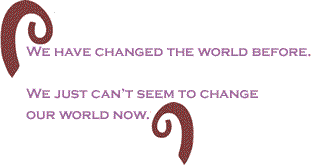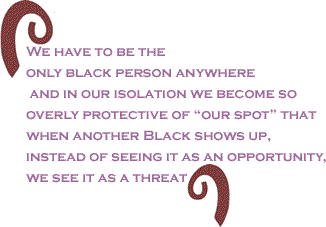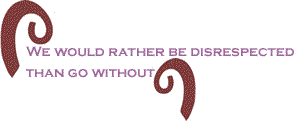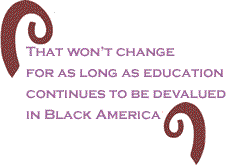
|
|||||||||||||||||||||
 |
|||||||||||||||||||||
 |
|
|
Black History Month is time when Black America reminds the rest of the world of the significant contributions African Americans have made to the advancement of society. Bombarded with negative images the other months of the year (twelve when you acknowledge that negative imagery doesn’t take a break even in February), Black America—in the collective—finds itself in the precarious position of always talking about what we “once did”, instead of what we must do to change the less than equal socio-economic conditions the overwhelming majority of Blacks find themselves facing. To put the problem more bluntly, Black America can’t escape from its own history. Creating civilization, spreading the practice of monotheism in religion, surviving and defeating slavery in relative ignorance, and overcoming legal segregation in the face of massive resistance were monumental accomplishments. We have changed the world before. We just can’t seem to change our world now. Oh, don’t get me wrong. Black America’s footprint is all over music (rap/hip hop/jazz), television (Oprah/BET/TV One), sports on the one hand and of course, poverty, prison and crime on the other. Cultural influence doesn’t amount to cultural control. Blacks in America can become rich, can become famous, can become influential if they subjugate themselves on certain issues: race, injustice, white supremacy, poverty and reparations—you know, all the stuff white folks don’t want to talk about and wish we’d just “get over.” And instead of bringing about the type of action that will force change, we now conform, or plainly put, we change. Assimilation has become acculturation for Black America. What we see as success, now has become part of our own demise, as to be like “them” is to run from “us.” Black America may never change if it continues to look for change in all the wrong places. Let’s start with the basic premise of survival, economics. Racism in America has always been economic. The right to earn is a fundamental “natural right” (see John Locke and Enlightenment theories). Even illegal immigrants know that once they get to America, nobody stops them from working. Competition in the free market economy ensures that there will always be work. Whether there will always be fair and equitable wages is another story, but where there are quality jobs, you will find a network of people always looking out for each other to insure than not only they work, but “their people” work too. Not Black America. We suffer from “only one” syndrome. We have to be the only black person anywhere and in our isolation we become so overly protective of “our spot” that when another Black shows up, instead of seeing it as an opportunity, we see it as a threat. It becomes a competition to become one of them by eliminating one of us. And change never comes…The little money we make, on a per capita basis, while still three-fifth of what they make (59 cents on the dollar), is still a 600 billion dollar block of the American economy. You can leverage a lot with $600 billion dollars. But not when you give 92 cents on every dollar away where it benefits little in your own community. And the things we spend our money on is crazy. Every black woman (damn near) you see has horse hair weaved into her own hair. Every black men (damn near) you see has fool’s gold around his neck, on his hand, around his wrist, on his fingers. Self-worth is now in the possessions we own (or lease—mostly lease or rent). Our identity has become what America says we should wear, we should buy, we should eat; whatever afflicts America, afflicts even worse—from debt to death. Those communities that stay out of debt, spend in moderation and spend with themselves, prosper enormously. Black America hasn’t figured out that they’re going to have to stop spending with those who don’t hire them, don’t reinvest with them, and who don’t honor their patronage. We could close dozens of banks and retailers by simply not honoring them with our patronage. We could change many of their business practices overnight, but we would rather pay more than go without. We would rather be disrespected than go without. We would rather be broke and look the part, than be rich and not look the part.
Change will never occur this way. I’m convinced that the more maniacal the black image, the more the American media promotes it. Just look at the promotion of Forrest Whitaker’s Oscar nomination in The Last King of Scotland, some calling it, “the greatest acting performance-ever.” You’re kidding me, right? But just as Denzel and Halle before him, Whitaker will win and the negative imagery of black brutality is burned in society’s mind, transcending the role he played (as the black crooked cop and the whorishly abusive mom images were elevated). Of all the images to lift up in the history of Africans in the world, Idi Amin was the only one they could come up with? Everybody else thinks we’re crazy because of these acculturation practices, and now society has taken every step possible to make us look even crazier, and some of us gladly play the role. The proof is in the imagery of Black America. Instead of talking about how our racial dignity is being deconstructed, we find ourselves in frivolous debates; Is Obama “black” enough? Should the N-word be banned? Should gangsta (gutter) rap be censored. Should 12 year olds have cell phones? Should children be spanked? And it goes on and on. The conflicts of the dominant culture become our conflicts when we know what is right, and what African centered cultural mores and values teach us. We don’t look for those morals or values, though. We’d rather look in the wrong place for a right (contemporary or politically correct) fit. We know, but we act like we don’t so we don’t progress. Education is the key to uplifting the race. Yet, education has become so devalued in Black America that our children think it's actually cool to be dumb. “Street smarts” might get one or two people out of poverty, but the exception has now become the rule as our children have become the “anti-education” segment of society. So the uneducated have become the feeder for the prison industrial complex. And some are okay with this. Instead of being viewed as educated, many prefer to be viewed as “hard and ignorant.” Coming from the streets is a badge of pride, and it’s the image America’s media promotes that’s seen around the world. So when other civilized societies come in contact with the American Black, they see them as stupid, incompetent or maniacal. In any case, they are to be distrusted, disrespected and exploited. There is no incentive for others to change the education system for as long as in produces an illiterate class that can’t compete in the global economy, except as services laborers or prison laborers. That won’t change for as long as education continues to be devalued in Black America. It’s a conflict to the whole notion of change.
Mahatma Ghandi once said, “You have to be the change you want to see in the world.” Black America is looking for others (“the white man,” etc.) to change, and it is us that need to change. The race can’t change as long as it won’t change its cultural and community practices. We need to stop trying to be something we’re not, “Eurocentrist Africans.” We need to return to Afro-centrist values and morals, and we need to look to community first, look to ourselves first, to pull ourselves and our communities up, as did the Japanese, the Jewish, the Irish, the Korean, and now the Mexican immigrant. Looking out for self isn’t a bad thing. That’s why America continues to be America, and everybody prospers but us. We’re looking for change in all the wrong places. BC columnist Anthony Asadullah Samad is a national columnist, managing director of the Urban Issues Forum and author of the upcoming book, Saving The Race: Empowerment Through Wisdom. His Website is www.AnthonySamad.com. Click here to contact Mr. Samad. |
|
| Home | |
| February
22, 2007 Issue 218 |
||||||||||||||
|
||||||||||||||
| Printer Friendly Version in resizeable plain text format | ||||||||||||||
 |
||||||||||||||
|
||||||||||||||
 |
||||||||||||||
 |
||||||||||||||
 |
||||||||||||||
| |
||||||||||||||
| |
||||||||||||||































